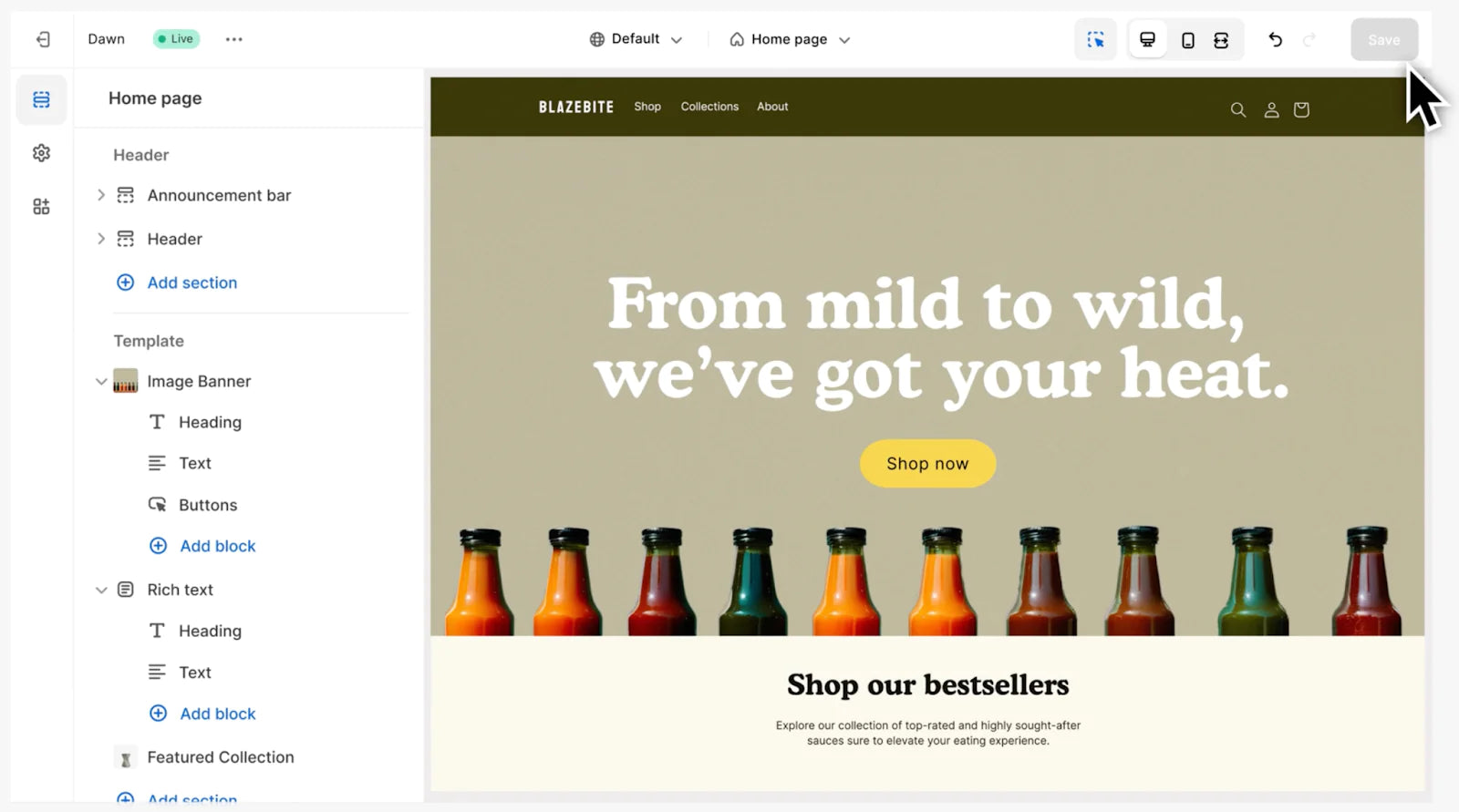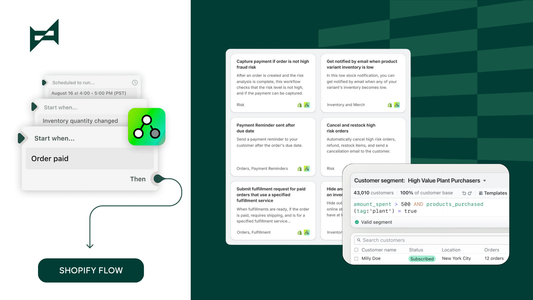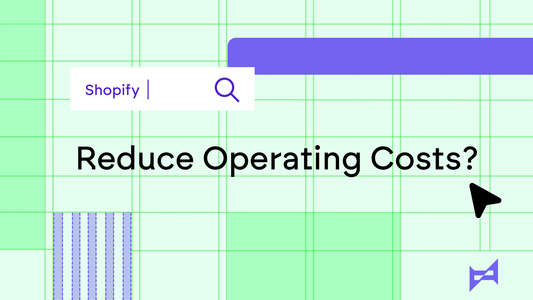5 best e-commerce platforms for businesses in 2024
What is an e-commerce platform?
An e-commerce platform is a comprehensive software tool that enables businesses to manage and streamline their online sales. It's the foundation for any digital storefront, offering a suite of services from product listing and inventory management to payment processing and customer service.
These platforms are designed to help businesses of all sizes navigate the complexities of online retail, ensuring they can efficiently reach and serve their customers in the digital marketplace. The right e-commerce platform can significantly impact a business's ability to grow, adapt, and thrive in the competitive world of online shopping.
In this blog post, we will give you an overview of 5 best e-commerce platforms for businesses in 2024 to help you make an informed decision.
5 best e-commerce platforms for businesses in 2024
Shopify
 Overview
Overview
- Shopify, renowned for its simplicity, is designed for beginners and small to medium businesses venturing into e-commerce. Its turnkey approach simplifies the online selling process.
Features
- Intuitive Interface: Streamlines store setup and management.
- Diverse Templates: Offers a wide range of customizable designs.
- Extensive App Store: Enhances functionality with numerous apps.
- Comprehensive Customer Support: Accessible and helpful assistance.
Benefits
- Ease of Use: User-friendly, even for tech novices.
- Multi-Channel Selling: Integrates with various platforms, including social media.
- Strong Infrastructure: Reliable performance under heavy traffic.
Considerations
- Customization Limits: Less flexibility without coding skills.
- Transaction Fees: Additional costs if not using Shopify Payments.
Pricing
- Starts from $29/month, with tiered plans to cater to growing businesses.
Real-World Example
- Founded by Kylie Jenner, Kylie Cosmetics leveraged Shopify's platform to launch and scale up, becoming a major player in the cosmetics industry.
-> Explore more about Shopify Plus
WooCommerce
 Overview
Overview
- WooCommerce, a free, open-source e-commerce plugin for WordPress, offers flexibility and customization for businesses integrated into the WordPress ecosystem.
Features
- WordPress Integration: Seamless integration with WordPress websites.
- Customization: Extensive customization options with themes and plugins.
- Scalability: Adaptable to both small and large businesses.
- Community Support: Strong community support and resources.
Benefits
- Flexibility: Tailor the store to specific needs.
- Content Management: Leverage WordPress's robust content management.
- Cost-Effective: Low initial costs, pay for only what you need.
Considerations
- Technical Knowledge Required: Best suited for those with some WordPress experience.
- Additional Costs: Potential costs for hosting, themes, and plugins.
Pricing
- Free to install, with variable costs depending on additional features and hosting.
Real-World Example
- Used by businesses like "Airstream," a well-known travel trailer company, WooCommerce provides them with the flexibility to customize their online store fully.
Magento
 Overview
Overview
- Magento, acclaimed for its robustness and scalability, is ideal for large businesses requiring a customizable and powerful e-commerce solution.
Features
- High Customizability: Extensive customization options for a tailored online store.
- Scalability: Ideal for growing businesses with complex e-commerce needs.
- Advanced SEO: Strong SEO capabilities for better online visibility.
- Vast Extension Marketplace: A broad range of plugins and themes.
Benefits
- Flexibility in Design and Functionality: Allows for a highly tailored e-commerce experience.
- Suitable for Large Scale Operations: Handles large product inventories and customer bases efficiently.
- Community and Professional Support: Active community support and professional services available.
Considerations
- Technical Expertise Required: Best suited for businesses with access to development resources.
- Higher Cost of Ownership: Involves costs for hosting, development, and maintenance.
Pricing
- Community Edition is free; Enterprise Edition has additional costs based on business size and requirements.
Real-World Example
- Renowned brands like "Canon," the global camera manufacturer, have utilized Magento for its robust and scalable e-commerce capabilities, managing a vast product range and customer base.
BigCommerce
 Overview
Overview
- BigCommerce is renowned for its robustness and scalability, making it a great fit for medium to large businesses looking to expand their e-commerce operations.
Features
- Wide Range of Built-In Features: Comprehensive e-commerce tools without the need for extensive plugins.
- Multi-Channel Selling: Seamless integration with various marketplaces and social platforms.
- No Transaction Fees: Offers cost savings on sales transactions.
- Advanced SEO Tools: Enhanced capabilities for better search engine rankings.
Benefits
- Scalability: Efficiently supports business growth and increasing traffic.
- Ease of Use: User-friendly interface, despite its comprehensive feature set.
- Diverse Payment Gateways: Supports a wide range of payment options.
Considerations
- Complexity for Beginners: Might be overwhelming for newcomers to e-commerce.
- Limited Free Themes: Premium themes come at an additional cost.
Pricing
- Pricing plans start at $29.95/month, offering various tiers suitable for different business sizes.
Real-World Example
- "Skullcandy," a popular audio equipment company, leverages BigCommerce for its comprehensive features, supporting their significant product catalog and complex sales processes.
Wix
 Overview
Overview
- Wix is celebrated for its simplicity and aesthetic appeal, making it a top choice for small businesses and individual entrepreneurs stepping into e-commerce.
Features
- Drag-and-Drop Builder: Intuitive website creation.
- Visually Appealing Templates: Designed for stunning storefronts.
- Basic E-commerce Functionalities: Essential tools for online selling.
- Wix App Market: Additional functionalities through apps.
Benefits
- Ease of Use: Ideal for beginners without technical skills.
- Design Flexibility: Creative freedom with design templates.
- Affordability: Cost-effective for small-scale operations.
Considerations
- Scalability: May not suit rapidly growing businesses.
- E-commerce Limitations: Basic features compared to specialized e-commerce platforms.
Pricing
- E-commerce plans start at $23/month, offering an accessible entry for small businesses.
Real-World Example
- Small businesses and independent creators, such as "Baketivity," a kids' baking kit company, have found success with Wix for its ease of use and visually appealing storefront designs.
E-commerce platform types
In the world of e-commerce, platforms generally fall into two categories based on hosting: cloud-hosted (or hosted) and self-hosted. To make your online store accessible to the public, you have to have a hosting solution.
Cloud-Hosted Platforms:
- Ease of Use: These platforms, like Shopify, manage the hosting for you. This means you don't have to worry about technical aspects like server maintenance, updates, and security.
- Automatic Updates & Security: They provide automatic updates, ensuring your site always runs the latest software. Built-in security features protect against online threats.
- Cost Efficiency: Often, they are cost-effective for small to medium businesses, as they eliminate the need for a separate hosting service.
- Limitations: However, they might offer limited customization compared to self-hosted platforms and could have platform-specific restrictions.
Self-Hosted Platforms:
- Customization & Control: Platforms like WooCommerce offer extensive customization options. You can modify code and switch servers as needed.
- Technical Management: They require you to manage hosting, which means dealing with server maintenance, updates, and security.
- Scalability: Ideal for businesses with specific e-commerce needs that require unique setups.
- Cost Consideration: While the platform itself might be free or low-cost, expenses can arise from hosting, maintenance, and additional resources needed for management.
In summary, cloud-hosted platforms are user-friendly and require less technical knowledge, making them ideal for businesses that prefer an all-in-one solution. Self-hosted platforms, on the other hand, offer greater control and customization but require more technical expertise and resources for maintenance and security. The choice depends on your business's technical capability, need for customization, and resource allocation for website management.
Choosing an e-commerce platform
Feature checklist
When selecting an e-commerce platform for your business, it is critical to consider various factors. While one platform may be ideal for one merchant, it may not be the best option for another, depending on their unique business objectives and requirements. Therefore, it is essential to evaluate the following features:
1. Safe and Reliable Checkout and Payment Gateways:
The checkout process is a crucial aspect of your e-commerce site. You need a secure and dependable way to accept payments while ensuring a smooth and speedy process for your shoppers. For instance, Shop Pay has been shown to increase checkout speed by four times. Shopify also offers straightforward integrations with over 100 payment gateways, enabling you to provide the most relevant payment options to your audience worldwide.
It is also crucial to establish trust during this stage, which entails accommodating familiar payment methods such as PayPal and mobile wallets, which can make customers more comfortable providing payment information.
2. Online and Offline Selling Options:
A robust e-commerce platform should seamlessly integrate your online and offline sales channels. This means having a physical point-of-sale (POS) system that syncs with your online store.
Additionally, consider the types of POS devices available. Does the platform manufacture its POS hardware, or do you need to use a third party? Are there convenient options for handling transactions at a pop-up event, market stall, or via your mobile phone?
3. Hosting Environment:
Your choice of domain host will impact the cost, performance, and security of your e-commerce website. A dependable hosting provider ensures that your website is always accessible, loads quickly, and is protected from cyber threats.
Platforms such as Shopify include hosting as part of their offering. Self-hosting your website increases control and customization but also raises the risk of security and technical issues.
4. Inventory Management and Shipping:
If you are serious about selling, it is prudent to choose an e-commerce platform that assists with stock level tracking, supplier management, and automating reorder processes.
Choose a platform with robust shipping options, including the ability to integrate with courier services, offer various shipping options to customers, and handle returns.
5. Marketing and Customer Growth Tools:
Search engine optimization (SEO) tools, email marketing tools, social media integration, and customer review functionality are essential components for developing an ongoing marketing strategy.
Regardless of your niche, you need to invest time in promoting your online store and building your brand. The right e-commerce platform will include advanced features such as loyalty programs, personalized recommendations, and customer segmentation.
6. Security Features:
Security is paramount in e-commerce. Your platform should provide robust security features to safeguard your business's and customers' data. This includes SSL certificates, two-factor authentication, and compliance with PCI DSS standards for secure payment processing.
7. Business and Financial Management Features:
The appropriate e-commerce platform will provide features to help you manage your business and finances, including sales reporting and analytics, tax calculation, and integration with accounting software.
8. Support:
Finally, when selecting an e-commerce platform, consider the level of customer support provided. Look for platforms that offer 24/7 support through multiple channels, including phone support, email, and live chat.
Self-help resources such as tutorials and knowledge-base articles are also invaluable for quick fixes.
Business needs
When considering an e-commerce platform, it is essential to evaluate not only its features and solutions, but also your business needs. To this end, the following aspects of your current situation and future goals should be taken into account:
Firstly, it is important to have a clear understanding of your costs. While budget should not be the sole determining factor, it is certainly crucial. While it is possible to get started with as little as $100, it is likely that more funds will be invested in the startup business before any returns are made, particularly upfront. Research findings indicate that most small business owners spend about $40,000 in their first year of operation, with only 9% of that sum allocated to online business needs (although Shopify merchants spent an average of $38,000, while non-Shopify merchants came in closer to $41,000). It is therefore imperative to choose an e-commerce platform that provides the necessary features at a cost that does not deplete your budget.
When assessing costs, it is important to consider more than just the setup and monthly fees. Payment processing fees, charges for adding integrations, and potential fees for customer support (such as those charged by PrestaShop) should all be taken into account. If hosting is not included, this will also be an additional expense.

Source: Shopify
Secondly, finding a platform that is a good fit for your business model is crucial. Online selling can take many forms, from selling digital to tangible products. If you are involved in dropshipping, for instance, you will require an e-commerce platform that can easily connect in the backend to streamline operations. Shopify provides a great platform with a wide range of apps that can be added to your site to facilitate selling for different business models. Examples include apps for print-on-demand and subscription businesses, which make it easier to operate on Shopify than on other platforms.
Thirdly, it is important to consider your future business plans, even if your business has modest beginnings. You likely have visions for where you would like to take your business in the future. These goals are critical to think about, and you may also want to consider adding physical retail to your business. With a limited e-commerce platform, POS integrations may be complicated, leading to inaccurate inventory data due to disjointed online and in-person systems. With a platform like Shopify, everything is tracked and synced in a single place, providing accurate inventory and sales data at all times. Additionally, you can be up and running for in-person sales in minutes, and you can also add services such as local delivery and take advantage of the Shopify Fulfillment Network.
Finally, additional funding may be required by many businesses down the line. According to research, as many as two-thirds of entrepreneurs draw on personal savings to finance their business in the early stages, with as many as 23% borrowing from friends and family and 21% utilizing personal loans. However, other business funding options pose less risk to personal relationships. Therefore, it is paramount to select an e-commerce platform that provides merchants with support, such as Shopify Capital small business lending.
In conclusion, it is crucial to carefully evaluate e-commerce platforms before making a decision. It is essential to select a platform that caters to your business needs while helping you achieve your objectives.
Conclusion
The blog "5 best e-commerce platforms for businesses in 2024" offers a detailed analysis of top e-commerce platforms, including Shopify, WooCommerce, Magento, BigCommerce, and Wix. It examines each platform's unique features, benefits, and considerations, and delves into different hosting environments. The blog is tailored for businesses seeking guidance on choosing the right e-commerce solution, balancing factors like payment gateways, security, and customer support with business needs and growth objectives. This comprehensive guide is pivotal for informed decision-making in the e-commerce platform selection process.




